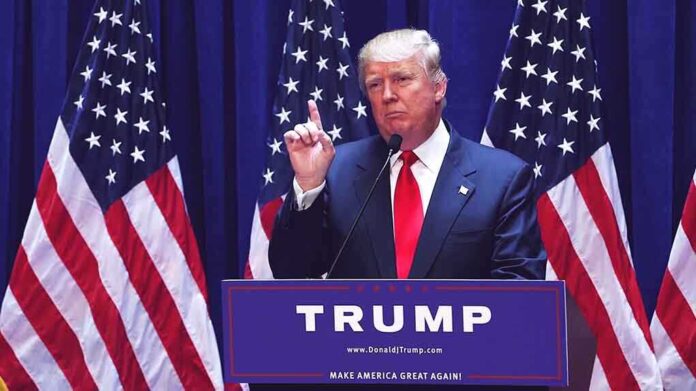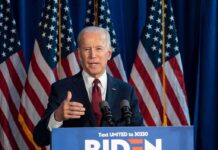
President Trump’s 1,100-page “One Big Beautiful Bill Act” squeaked through the House by a single vote, setting the stage for a historic legislative overhaul of taxes, spending, and social programs that Republicans have promised American voters.
Key Takeaways
- House Republicans passed Trump’s legislative package with a razor-thin 215-214 vote margin, with two Republicans joining all Democrats in opposition
- The bill extends and expands the 2017 tax cuts while temporarily eliminating taxes on tips, overtime pay, and car loan interest
- The legislation allocates $175 billion for border security (including $46.5 billion for the border wall) and adds $150 billion in defense funding
- Creates new “Trump” savings accounts for children born between 2025-2029 with $1,000 in government seed money
- The bill now faces further scrutiny in the Senate, where Republicans plan to make changes before sending it back to the House
Landmark Trump Agenda Package Passes House
House Republicans successfully passed President Trump’s ambitious legislative package on Thursday morning, fulfilling a key campaign promise but revealing deep divisions within their slim majority. The 1,100-page bill, officially named the “One Big Beautiful Bill Act,” contains the bulk of Trump’s agenda and required intense negotiation to secure passage. After last-minute changes to win over conservative holdouts, the final vote tally stood at 215-214, with Republican Representatives Thomas Massie and Warren Davidson joining all Democrats in opposition, while GOP Rep. Andy Harris voted present.
The legislative package extends and expands the 2017 tax cuts that were set to expire, while temporarily eliminating taxes on qualified tips, overtime pay, and car loan interest. It also increases the SALT deduction cap and raises the debt ceiling by $4 trillion to prevent a government default. These measures are designed to fulfill Trump’s promise to strengthen the economy while providing tax relief to working Americans, though the Congressional Budget Office previously analyzed that the bill would increase the deficit.
— Tom Emmer (@GOPMajorityWhip) May 20, 2025
Border Security and Defense Spending Boost
The bill allocates $175 billion for border security, including $46.5 billion specifically earmarked for completing the wall along the U.S.-Mexico border. This substantial investment represents a fulfillment of one of Trump’s signature campaign promises and addresses the ongoing crisis at the southern border. The legislation also provides $150 billion in additional defense funding, targeting improvements to missile defense systems and Navy expansion, priorities that Trump has consistently emphasized as central to his “America First” national security strategy.
Beyond defense and border security, the bill introduces a fast-track system for natural gas exploration permits, supporting Trump’s energy independence agenda. It also ends the controversial mandate requiring two-thirds of new car sales to be electric by 2032, which had been implemented under the previous administration. These provisions reflect Trump’s commitment to unleashing American energy production and rolling back regulations that conservatives have long criticized as overreach.
🚨This wasn’t widely covered in the news, so I will tell you:
Congress was scheduled to vote on rescissions THIS WEEK to cut the waste that DOGE found, but the votes were quietly canceled.
USAID and other programs like PBS and NPR were to be targeted.https://t.co/LRjID4I73y
— Thomas Massie (@RepThomasMassie) May 7, 2025
New “Trump” Savings Accounts and Welfare Reform
One of the most innovative aspects of the legislation is the establishment of “Trump” savings accounts for children born between January 1, 2025, and January 1, 2029. These accounts will receive $1,000 in government seed money, creating a new generational investment program that conservatives hope will encourage financial literacy and long-term saving habits among the next generation of Americans. This program represents a novel approach to addressing wealth-building that aligns with conservative principles of personal responsibility.
The bill also implements stricter work requirements for Medicaid and Supplemental Nutrition Assistance Program (SNAP) recipients, a reform that Republicans have long advocated. These changes are designed to reduce dependency on government programs while ensuring that assistance goes to those truly in need. To offset reduced revenue from tax cuts, the bill proposes slashing funding from social safety net programs, reflecting the administration’s priority of fiscal discipline after years of runaway spending under previous leadership.
Senate Challenges Ahead
The bill now moves to the Senate, where further debate is expected, particularly on spending cuts and Medicaid rules. The legislation passed under budget reconciliation rules, allowing it to be fast-tracked in the Senate without a filibuster, but Senate Republicans have already indicated plans to make changes before sending it back to the House. This process could complicate final passage, as any modified version would need to be approved again by the House before reaching President Trump’s desk for signature.
Speaker Mike Johnson worked closely with President Trump to align the House Freedom Caucus and moderate Republicans to pass the bill, navigating a particularly challenging political landscape with the extremely narrow Republican majority. The single-vote margin of victory underscores both the difficulty of the task and the importance the Republican leadership placed on delivering this package before the Memorial Day deadline. The bill represents the most comprehensive implementation of Trump’s agenda since his return to office.
































